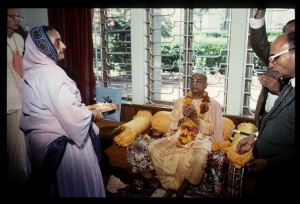CC Antya 5.107 (1975): Difference between revisions
(Vanibot #0027: CCMirror - Mirror CC's 1996 edition to form a basis for 1975) |
(Vanibot #0020: VersionCompareLinker - added a link to the Version Compare feature) |
||
| Line 2: | Line 2: | ||
<div style="float:left">'''[[Sri Caitanya-caritamrta (1975)|Śrī Caitanya-caritāmṛta (1975)]] - [[CC Antya (1975)|Antya-līlā]] - [[CC Antya 5 (1975)|Chapter 5: How Pradyumna Miśra Received Instructions from Rāmānanda Rāya]]'''</div> | <div style="float:left">'''[[Sri Caitanya-caritamrta (1975)|Śrī Caitanya-caritāmṛta (1975)]] - [[CC Antya (1975)|Antya-līlā]] - [[CC Antya 5 (1975)|Chapter 5: How Pradyumna Miśra Received Instructions from Rāmānanda Rāya]]'''</div> | ||
<div style="float:right">[[File:Go-previous.png|link=CC Antya 5.106 (1975)|Antya-līlā 5.106]] '''[[CC Antya 5.106 (1975)|Antya-līlā 5.106]] - [[CC Antya 5.108 (1975)|Antya-līlā 5.108]]''' [[File:Go-next.png|link=CC Antya 5.108 (1975)|Antya-līlā 5.108]]</div> | <div style="float:right">[[File:Go-previous.png|link=CC Antya 5.106 (1975)|Antya-līlā 5.106]] '''[[CC Antya 5.106 (1975)|Antya-līlā 5.106]] - [[CC Antya 5.108 (1975)|Antya-līlā 5.108]]''' [[File:Go-next.png|link=CC Antya 5.108 (1975)|Antya-līlā 5.108]]</div> | ||
{{CompareVersions|CC|Antya 5.107|CC 1975|CC 1996}} | |||
{{RandomImage}} | {{RandomImage}} | ||
==== TEXT 107 ==== | ==== TEXT 107 ==== | ||
<div class="verse"> | <div class="verse"> | ||
:grāmya-kavira kavitva śunite haya | :grāmya-kavira kavitva śunite haya 'duḥkha' | ||
:vidagdha-ātmīya-vākya śunite haya | :vidagdha-ātmīya-vākya śunite haya 'sukha' | ||
</div> | </div> | ||
| Line 25: | Line 24: | ||
<div class="translation"> | <div class="translation"> | ||
"Hearing the poetry of a person who has no transcendental knowledge and who writes about the relationships between man and woman simply causes unhappiness, whereas hearing the words of a devotee fully absorbed in ecstatic love causes great happiness. | |||
</div> | </div> | ||
| Line 32: | Line 31: | ||
<div class="purport"> | <div class="purport"> | ||
Grāmya-kavi refers to a poet or writer such as the authors of novels and other fiction who write only about the relationships between man and woman. Vidagdha-ātmīya-vākya, however, refers to words written by a devotee who fully understands pure devotional service. Such devotees, who follow the paramparā system, are sometimes described as sajātīyāśaya-snigdha, or | Grāmya-kavi refers to a poet or writer such as the authors of novels and other fiction who write only about the relationships between man and woman. Vidagdha-ātmīya-vākya, however, refers to words written by a devotee who fully understands pure devotional service. Such devotees, who follow the paramparā system, are sometimes described as sajātīyāśaya-snigdha, or "pleasing to the same class of people." Only the poetry and other writings of such devotees are accepted with great happiness by devotees. | ||
</div> | </div> | ||
Latest revision as of 02:20, 27 January 2020

A.C. Bhaktivedanta Swami Prabhupada
TEXT 107
- grāmya-kavira kavitva śunite haya 'duḥkha'
- vidagdha-ātmīya-vākya śunite haya 'sukha'
SYNONYMS
grāmya-kavira—of a poet who writes poetry concerning man and woman; kavitva—poetry; śunite—to hear; haya—there is; duḥkha—unhappiness; vidagdha-ātmīya—of a devotee fully absorbed in ecstatic love; vākya—the words; śunite—to hear; haya—there is; sukha—happiness.
TRANSLATION
"Hearing the poetry of a person who has no transcendental knowledge and who writes about the relationships between man and woman simply causes unhappiness, whereas hearing the words of a devotee fully absorbed in ecstatic love causes great happiness.
PURPORT
Grāmya-kavi refers to a poet or writer such as the authors of novels and other fiction who write only about the relationships between man and woman. Vidagdha-ātmīya-vākya, however, refers to words written by a devotee who fully understands pure devotional service. Such devotees, who follow the paramparā system, are sometimes described as sajātīyāśaya-snigdha, or "pleasing to the same class of people." Only the poetry and other writings of such devotees are accepted with great happiness by devotees.